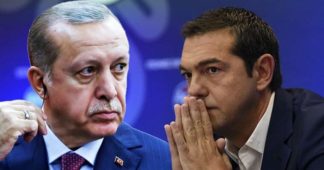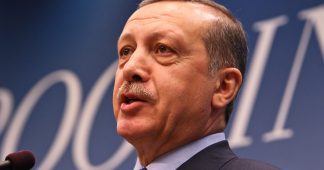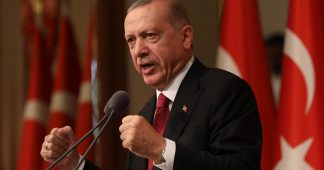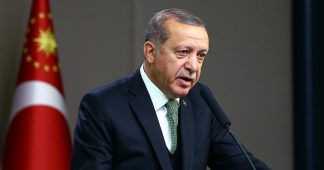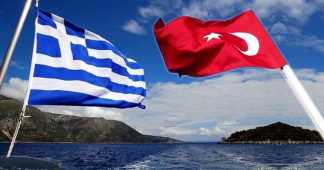Jun 10, 2022
In a series of tweets in the Greek language, Turkish President Recep Tayyip Erdoğan has directly threatened Greeks not to go too far with their stance in the Aegean Sea, otherwise “they will regret” it.
The Greek government called for national unity toward an “unpredictable” neighbour, while former Prime Minister Alexis Tsipras replied to Erdoğan in Turkish.
Meanwhile, German Chancellor Olaf Scholz is visiting Thessaloniki today to take part in the South East European Cooperation Process (SEECP), but Berlin’s mediation efforts may have little chance of succeeding.
Amid a fresh escalation in the Greek-Turkish relations following Greek Prime Minister Kyriakos Mitsotakis’ speech at the US Congress last month, Erdoğan directly threatened Greeks on Twitter in their own language.
“We warn once again Greece to be prudent, to stay away from dreams, rhetoric and actions that will lead it to results for which it will regret, as happened a century ago”, Erdoğan tweeted.
By invoking international treaties, Ankara pushes for the demilitarisation of Greek islands neighbouring Turkey, claiming that the presence of the Greek army is a threat to the country’s security.
On the other hand, Greeks claim they maintain military forces there, as, on the other side of the Aegean, Turkey has the İzmir-based “Aegean Army”.
Greeks also have bad memories from the past, as in 1974, when the Junta pulled out troops from Cyprus, Turkey invaded and occupied Cypriot territory illegally, remaining until today.
Erdoğan is also irritated by the fact that Greece is using the EU and NATO -in the latter Turkey is also a member – as a protective umbrella in its relations with Turkey. For its part, Turkey has insisted that pending issues should be resolved bilaterally.
“The attempt to instrumentalise NATO and third countries, involving them in the illegality of various military exercises on islands with a non-militarised regime, is just an attempt that will have a disastrous end”, Erdoğan said.
Athens reacted through the government spokespersons Yiannis Oikonomou who said, “It is known that Greek is the language of logic, freedom and law. Its native users and the western world know this very well. The tactics chosen by Turkey do not fall into any of these versions”.
Mitsotakis called for national unity toward an “unpredictable” neighbour who, according to him, “the more he is isolated the more he gets angry”.
For his part, the main opposition leader and former prime minister Alexis Tsipras tweeted in Turkish: “Greece will protect its sovereignty against any threat. So let the provocations stop, and let us return to dialogue on the basis of international law. The answer to the economic crisis we all face together is not nationalism.”
German Chancellor Olaf Scholz is visiting Thessaloniki today to take part in SEECP but Berlin’s mediation efforts may have little chance of succeeding as Erdoğan has made it clear that for him, “Mitsotakis no longer exists”.
Things are getting more complicated considering that both countries will hold elections in 2023, a year that Turkey also celebrates 100 years since the creation of the Turkish state.
In Athens, there are growing rumours that snap elections could be held as early as September, and the ruling New Democracy (EPP) wants to re-approach the “patriotic” electorate.
In addition, both countries are faced with an unprecedented economic crisis with soaring prices and inflation dealing a severe blow to their citizens’ purchasing power.
Critics suggest that an escalation at this moment may serve both sides politically, but an “accident” due to this escalation cannot be ruled out.
Also read
Erdogan escalates rhetoric against Greece and mobilizes Imams in his re-election bid
Greece refutes Turkey’s claims in Aegean Sea
We remind our readers that publication of articles on our site does not mean that we agree with what is written. Our policy is to publish anything which we consider of interest, so as to assist our readers in forming their opinions. Sometimes we even publish articles with which we totally disagree, since we believe it is important for our readers to be informed on as wide a spectrum of views as possible.
